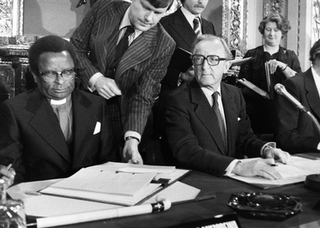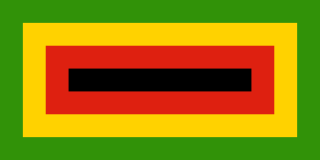
Zimbabwe Rhodesia was an unrecognised state that existed from 1 June 1979 to 11 December 1979. Zimbabwe Rhodesia was preceded by an unrecognised republic named Rhodesia and was briefly followed by the re-established British colony of Southern Rhodesia, which according to British constitutional theory had remained the proper government after Unilateral Declaration of Independence (UDI) in 1965. About three months later, the re-established colony of Southern Rhodesia was granted internationally recognised independence within the Commonwealth as the Republic of Zimbabwe.

The Zimbabwe African National Union – Patriotic Front (ZANU–PF) is a political organisation which has been the ruling party of Zimbabwe since independence in 1980. The party was led for many years under Robert Mugabe, first as Prime Minister with the Zimbabwe African National Union (ZANU) and then as President from 1987 after the merger with the Zimbabwe African People's Union (ZAPU) and retaining the name ZANU–PF, until 2017, when he was removed as leader.
The Socialist Union of Popular Forces is a social-democratic political party in Morocco.

The Lancaster House Agreement, signed on 21 December 1979, declared a ceasefire, ending the Rhodesian Bush War; and directly led to the creation and recognition of the Republic of Zimbabwe. It required the imposition of direct British rule, nullifying Rhodesia’s 1965 Unilateral Declaration of Independence. British governance would be strictly proscribed to the duration of a proposed election period; after which independence would follow. Crucially, the political wings of the black nationalist groups ZANU and ZAPU, who had been waging the escalating, and increasingly violent insurgency, would be permitted to stand candidates in the forthcoming elections. This was however conditional to compliance with the ceasefire and the verified absence of voter intimidation.

Abel Tendekayi Muzorewa, also commonly referred to as Bishop Muzorewa, served as Prime Minister of Zimbabwe Rhodesia from the Internal Settlement to the Lancaster House Agreement in 1979. A United Methodist Church bishop and nationalist leader, he held office for only a few months.
The United African National Council (UANC) was a political party in Zimbabwe.

Zimbabwe African National Union – Ndonga is a minor political party in Zimbabwe. Its members were originally part of Zimbabwe African National Union, but split with what would become ZANU–PF over tribal tensions. A portion of the party reunified with ZANU-PF in 2015.

The Zimbabwe government consists of an elected head of state, the president, and a legislature. The presidential term lasts for 5 years, and is elected by majority, with a second round if no candidate receives a majority in the first round. The Parliament is bicameral, consisting of the House of Assembly and Senate. Following the 2013 constitution, the House of Assembly has 270 members. 210 are elected for five-year terms by single-member constituencies. Furthermore, the constitution specifies that for the two first parliaments, there are 60 additional seats reserved for women, 6 seats per province, which are filled based on the votes for in the single-member constituencies, using party-list proportional representation, distributed using the largest remainder method and the hare quota. The Senate has 80 members: 60 are elected for five-year terms in 6-member constituencies representing one of the 10 provinces, elected based on the votes in the lower house election, using party-list proportional representation, distributed using the hare quota. Additionally the senate consists of 2 seats for each non-metropolitan district of Zimbabwe elected by each provincial assembly of chiefs using SNTV, 1 seat each for the president and deputy president of the National Council of Chiefs and 1 male and 1 female seat for people with disabilities elected on separate ballots using FPTP by an electoral college designated by the National Disability Board.

Parliamentary elections were held in Zimbabwe on 31 March 2005 to elect members to the Zimbabwe House of Assembly. All of the 120 elected seats in the 150-seat House of Assembly were up for election.

Zimbabwe United People's Organisation (ZUPO) was a political party in Zimbabwe, formed on 29 December 1976, shortly after the Geneva Conference. ZUPO was led by Chief Jeremiah Chirau, (President) and Chief Kayisa Ndiweni (Vice-President). Both chiefs had served as Cabinet Ministers in the Rhodesian Front government. ZUPO was involved in the negotiation of the Internal Settlement Agreement, and Chief Chirau served as the Chairman of the Executive Council of the Transitional Government.

Rhodesia had limited democracy in the sense that it had the Westminster parliamentary system with multiple political parties contesting the seats in parliament, but as the voting was dominated by the White settler minority, and Black Africans only had a minority level of representation at that time, it was regarded internationally as a racist country.

The National Union of Popular Forces was founded in 1959 in Morocco by Mehdi Ben Barka and his entourage, because they found that the Istiqlal Party was not radical enough.

The National Assembly of Zimbabwe, previously the House of Assembly until 2013, is the lower house of the Parliament of Zimbabwe. Between 1989, when the Senate was abolished and 2005, when it was reestablished, the House of Assembly was the sole chamber, but it was one of two chambers from independence in 1980 until 1989 and has been so again since 2005.

The Senate of Zimbabwe is the upper of the two chambers in Zimbabwe's Parliament. It existed from independence in 1980 until 1989, and was re-introduced in November 2005. The other chamber of Parliament is the House of Assembly

The Zimbabwe Rhodesia general election of April 1979 was held under the Internal Settlement negotiated by the Rhodesian Front government of Ian Smith intended to provide a peaceful transition to majority rule on terms not harmful to Rhodesians of white descent. The internal settlement was not approved internationally but the incoming government under Bishop Abel Muzorewa did decide to participate in the Lancaster House talks which led to the end of the dispute and the creation of Zimbabwe.

The Zimbabwe parliamentary election of 1985 saw the re-election, with an increased majority, of the Zimbabwe African National Union - Patriotic Front government under Robert Mugabe which had first been elected five years previously prior to the country achieving independence. It was thus the first time a general election in Zimbabwe had been conducted under the administration of that country's authorities.

General elections were held in Southern Rhodesia in February 1980 to elect a government which would govern the country after it was granted internationally recognised independence as Zimbabwe, in accordance with the conclusions of the Lancaster House Agreement. The result was a victory for ZANU, which won 57 of the 100 seats. Its leader, Robert Mugabe became the first Prime Minister of Zimbabwe when the country officially became independent from the United Kingdom in April.

Before its split in 2005, the Movement for Democratic Change (MDC) was a Zimbabwean political party organised under the leadership of Morgan Tsvangirai. The MDC was formed in 1999 as an opposition party to President Robert Mugabe's Zimbabwe African National Union – Patriotic Front (Zanu-PF). The MDC was made up of many civic groups who campaigned for the "No" vote in the 2000 constitutional referendum, which would limit a president's service to two terms, before the introduction of a Prime Minister, as well as giving legal immunities to the State. However, as the term limit was not retroactive, Mugabe could still have maintained the presidency for two more terms. The most controversial part of the constitution was the land reform policies. It stated that, as in the Lancaster House Agreement, Britain would fund land reform from white settlers to landless black peasants. If Britain failed to compensate the farmers, the government would take the farms, without compensation. The party split over whether to contest the 2005 senate election, into the Movement for Democratic Change – Tsvangirai (MDC-T), the larger party led by Morgan Tsvangirai, and the Movement for Democratic Change – Ncube, a smaller faction then led by Arthur Mutambara and later led by Welshman Ncube. However, the two factions formed an electoral pact for the 2018 Zimbabwean general election called the MDC Alliance and re-united under the original name, the Movement for Democratic Change (MDC), in September 2018.

General elections were held in Zimbabwe on 29 March 2008 to elect the President and Parliament. Because of Zimbabwe's dire economic situation, the elections were expected to provide incumbent President Robert Mugabe with his toughest electoral challenge to date. Mugabe's opponents were critical of the handling of the electoral process, and the government was accused of planning to rig the election. Human Rights Watch said that the election was likely to be "deeply flawed."












